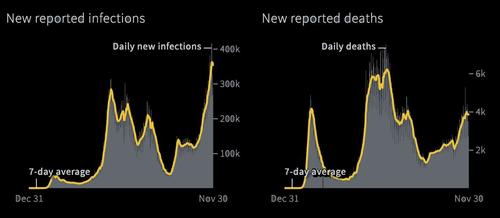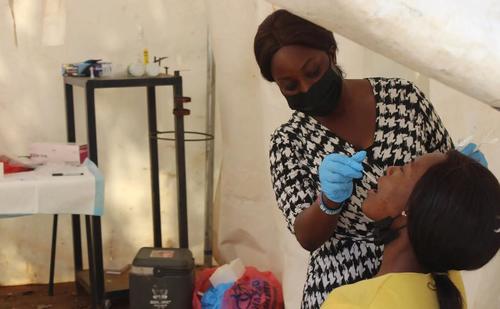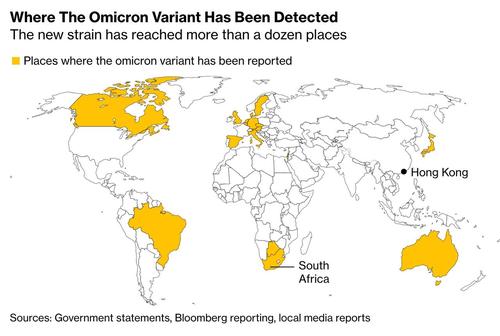Nigeria has detected its first case of the omicron coronavirus variant in travelers who arrived from South Africa in the past week, the country’s national public health institute said Wednesday, correcting its earlier statement that it found the variant in samples taken in October.
The Nigeria Center for Disease Control said in a second statement that it was the delta variant — not omicron as it had earlier stated — that was detected in the samples from October. It said the omicron variant was first detected in three travelers who arrived in the country in the past week.
“Samples obtained for the stipulated day two test for all travelers to Nigeria were positive for this variant in three persons with history of travel to South Africa,” Nigeria CDC director-general Dr. Ifedayo Adetifa said in the second statement.
Nigeria is the first West African country to have recorded the omicron variant since scientists in southern Africa detected and reported it and adds to a list of nearly 20 countries where the variant has been recorded, triggering travel bans across the world.
Much remains unknown about the new variant, including whether it is more contagious, as some health authorities suspect, whether it makes people more seriously ill, and if it can thwart the vaccine.
The Nigeria CDC urged the country’s states and the general public to be on alert and called for improved testing amid concerns that Nigeria’s low testing capacity might become its biggest challenge in the face of the new variant.
Testing for the virus is low in many states and even in the nation’s capital, Abuja. For instance, in parts of Kuje, a suburb of Abuja, Musa Ahmed, a public health official, told The Associated Press that no one has been tested for the virus for weeks.
The detection of the omicron variant in Africa’s most populous nation, with 206 million people, coincides with Nigeria’s new requirement that all federal government employees must be inoculated or present a negative COVID-19 test result done in the last 72 hours.
With the vaccine mandate taking effect on Wednesday, there were chaotic scenes at several offices in the nation’s capital as civil servants without a vaccination card or a negative PCR test were turned away by security agents.
Many of the workers and security agents were not wearing face masks.
“Governments should invest in promoting narratives around vaccine safety, efficacy, and the broader public health security implications of poor vaccines uptake,” Adewunmi Emoruwa, lead strategist at Gatefield, an Abuja-based consultancy. “If public servants are convinced about these issues, they are naturally more effective advocates to their constituents.”
Across Nigeria, the news of the omicron variant — which the World Health Organization has warned poses “very high” risk — has triggered concerns and renewed fears over the COVID-19 pandemic.
At the airport in Lagos, Nigeria’s largest city and economic hub, authorities insisted that travelers must wear their face masks at the counters, though not much attention is paid to many others flouting health protocols around the airport premises and in the city.
Nigeria — with 214,218 confirmed infections including nearly 3,000 deaths — has updated its travel advisory, ordering incoming international travelers to have a PCR test 48 hours before embarking on their trip to the country and two more tests, two days and seven days after arrival. Incoming international arrivals must also isolate for seven days.
Amid global concern over the omicron variant, the Nigeria CDC director-general told reporters that the country remains at alert in the face of the emerging crisis.
“We are working very hard to enhance ongoing surveillance, especially for inbound travelers, and also trying to ramp up testing (including) at the land borders,” he said.
A slew of nations moved to ban travels from many countries especially southern African nations in the aftermath of the emergence of the omicron variant. But the move has been widely condemned by many including South Africa President Cyril Ramaphosa, who is currently in Nigeria on a two-day visit.
Ghana also announced Wednesday that its scientists have detected cases of the omicron coronavirus variant in passengers who arrived in the country on Nov. 21.
The cases were detected at the Kotoka International Airport in the capital, Accra, after tests were conducted on incoming passengers, the Director General of the Ghana Health Service Patrick Kuma-Aboagye said Wednesday.
“We have not seen any omicron within the community of Ghana,” he said, according to tests in the country. But, he added, the danger is that omicron could be incubating in Ghana.
Further west on the continent, Liberia launched surveillance along its borders and placed health officers assigned there on full alert although no cases of the omicron variant have been reported there.
Liberia’s Health Minister Wilhelmina Jallah urged citizens to take preventive measures but not panic. She urged them to take advantage of the vaccination campaign.
“You cannot go to war if you are not prepared for the war,” she said. “And our preparation for this war against COVID-19 — whether it is alpha, delta or omicron — is to protect ourselves by getting at least a jab in your arm ... so we just want to raise this heightened alert.”




